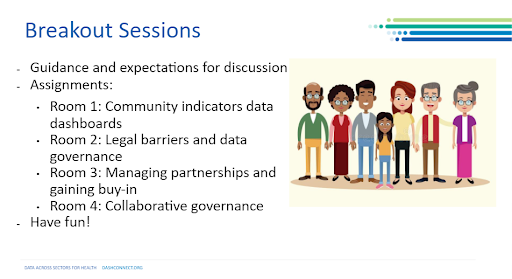Building Capacity of Early Stage Journeys - Reflections on DASH Mentor Program 2.0
The second iteration of the Data Across Sectors for Health (DASH) Mentor Program also referred to as Mentor 2.0, kicked off in February and ended in December 2020. Forty-two mentees were selected to work alongside 7 Mentor cohorts designed to support the development and deepening of multi-sector collaboration and alignment. Though COVID-19 hit and sidelined plans for many serving communities on the front lines, Mentees and Mentors alike succeeded in reaching their goals by adapting to new modes of operation amid the pandemic. COVID’s impact on their work helped elevate the need for both their coordination and direct services and created opportunities for stronger relationships and new avenues to build capacity for data sharing. Below are a handful of the stories, lessons learned, and ways in which Mentors and Mentees came together to share their areas of expertise this past year.
Engagement
With the shift from in-person to virtual, many community collaborations, including DASH Mentees, struggled to adapt to a socially distant way of conducting community engagement efforts. In response, Kalie McMonagle on staff with Mentor organization The Civic Canopy saw an opportunity to share their organization’s decade long expertise of facilitating multi-sector collaboration, choosing community health indicators, and addressing priorities, with all the Mentees.
Kalie led a two-part training designed to familiarize participants with new strategies and considerations to move their work online and also to provide hands-on experience with unfamiliar virtual tools.
“ There were hundreds of resource lists and webinars circulating when the pandemic started, but very few opportunities for workshopping and troubleshooting tools. We wanted to create a space where people could practice and engage with tools for remote meetings,” says McMonagle. Read about the webinar experience and view the recording here.
Increased Stakeholder Engagement & Community Impact
United Way of Northern Shenandoah Valley, (UWNSV) a Mentee in United Way Worldwide’s cohort of 7 Mentees, originally set a goal to have 50 interagency referrals this year. During their final one-on-one check-in with their Mentor, they reported a total of 198 referrals and 458 resolved cases (instances of people receiving the help they sought).
According to UWW’s final report of Mentor activities, UWNSV achieved this progress largely through an intentional communications strategy (monthly newsletter lifting up partner success stories and infographics, showing how Valley Assistance Network (VAN) worked and leveraging the COVID-19 window to get additional buy-in from partners. Read Clyde’s story through this engaging infographic (originally shared in their May 2020 newsletter) which demonstrated the agency’s response time and simple steps taken to generate three referrals for one client in 90-minutes.
“UWNSV thrived in their mentorship and made impressive progress on their primary goal of increasing partner engagement and collaboration in their data sharing effort with VAN.” Megan Tracz Director of Social Innovation with United Way Worldwide.
The success of the VAN through COVID-19 also changed UWNSV’s standing with local government and created an opportunity with the City of Winchester who asked them to manage $400,000 in CARES Act funding for housing support. (Read their success story).
The mentor organization Elevate Health leads an accountable community of health in Washington state also experienced a streamlining of care coordination that resulted in their communities coming together to provide mental health care. Read, Bright side to COVID-19 pandemic? Mental health care easier to access in Pierce County in the News Tribune.
Cross Cohort Connections
The DASH Program Office initially planned to host an in-person gathering of Mentees from across the program to further facilitate peer-to-peer connections and knowledge-sharing from DASH Mentors and subject matter experts from the All In: Data for Community Health Network. 2020 required us to call upon virtual breakout rooms and newly learned engagement strategies. In August, we hosted our first Mentee Virtual Meet Up with 42 participants.
“It was gratifying to host this inaugural virtual event and create a space for Mentees from organizations across the DASH Mentor cohorts to interact with one another. They heard some new ideas and were also validated in their experience that Mentees in other cohorts are facing similar challenges with stakeholder buy-in, generating momentum or gaining access to requested datasets. We look forward to hosting more opportunities for Mentees in the future,” says Anna Barnes, Program Director, Data Across Sectors for Health.
“It was great to meet with various entities across the country and discuss current data sharing topics such as using a health equity and racial equity lens to enhance collaboration...” said Sarah Kennedy, Senior Manager Epidemiology & Evaluation with Generate Health STL and mentee with the Elevate Health cohort.
Read a recap of the DASH Mentee Meetup Goes Virtual experience on our blog.
2-1-1 San Diego Community Information Exchange & United Way Worldwide, two Mentors working with a larger cohort of Mentees, came together on October 15 for a Mentee Meet-Up to discuss collaborative governance approaches and how to integrate equity and inclusion in governance. This topic was of interest to many of their mentees and the event offered an opportunity to create connections across cohorts.
“We want to help foster more of these connections through our Mentorship program during the third iteration of our program,” says Miriam Castro, Program Manager with Data Across Sectors for Health. “We’re developing a schedule of cross-cutting topics that Mentees across the board are interested in working on and offering the opportunity to learn together.”
Flexibility
“COVID-19 was at first seen as a challenge but became a use case to why data sharing is important. Although some of the timelines and expectations changed, the scope was altered to address the needs of the pandemic, and everyone was able to adapt and get the work done.” Karis Grounds, Vice President of Health and Community Impact, 2-1-1 San Diego.
Many Mentees who participated in the University of Pittsburgh Center for Social and Urban Research cohort were forced to delay or revise their Mentee goals due to COVID-19. However, Mentees reported that Mentor Robert Gradeck provided more frequent one-on-one check-in calls in lieu of cohort gatherings.
“Given that so many unexpected circumstances arose with so many of the mentorship groups, it was very important to be flexible and supportive of their needs. It often meant frequently changing meeting times to meet changing calendars, delivering content for asynchronous consumption rather than through scheduled activities, and finding and developing templates and planning canvas activities enabling the mentees to meet their goals as easily as possible.” Robert Gradeck Western Pennsylvania Regional Data Center, University of Pittsburgh Center for Social and Urban Research
COVID-19 highlighted pre-existing inequities and public health issues, such as homelessness and substance use disorders. Corporation for Supportive Housing (CHS) Mentee, Community Health Partnership, pivoted their project to link data on homeless encampments to reports of opioid use in order to better support community health workers in conducting outreach to persons experiencing homelessness.
In CHS’s final report of activities, they reported that Humility Homes, a supportive housing provider who were seeking out a data-sharing partnership with the local housing authority among other groups in order to find ideal candidates for a paper success project to finance additional construction in their area, experienced set back due to their front line work with COVID, but were able to come together toward the end of the mentorship.
“Because Humility Homes is a direct-service provider that operates emergency shelters and other congregate housing, COVID-19 management drastically impacted the team’s ability to adhere to the originally-established timeline. That said, during the late summer and early fall, Humility Homes found staff capacity and resources to re-engage with the project, and made tremendous strides. CSH as mentors facilitated conversations between Humility Homes and the local HMIS managing entity (Institute for Community Alliances), which resulted in the mutual decision to pursue a data-sharing agreement.” Gabriel Schuster, Senior Program Manager, Strategy & Impact, CSH.
Looking Ahead to Mentor 3.0
The DASH program office is using the stories, lessons learned and program evaluation data to make improvements and identify opportunities for expanded learning to increase the connections between Mentee organizations.
Data Across Sectors for Health has now launched its third round of the Mentorship Program to support seven cohorts of selected teams of “Mentees” to learn with and from DASH Mentors and community peers in order to accelerate their local multi-sector data-sharing efforts. Each selected Mentee collaboration will be matched to an experienced Mentor and will be eligible to receive up to $10,000 for participation, with most awards at $5,000 for groups of at least 2 participating organizations.
Is your organization ready to accelerate its local multi-sector data sharing efforts? Please visit the DASH website. Review the eligibility criteria, read the FAQs, and read about our Mentors. The application deadline is January 22, 2021.




